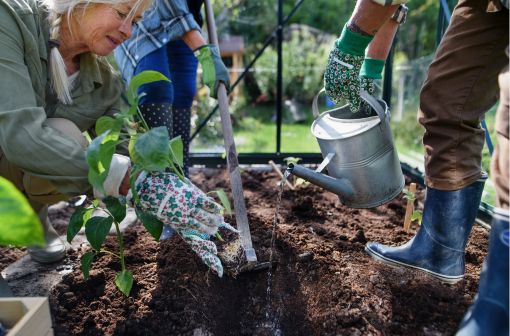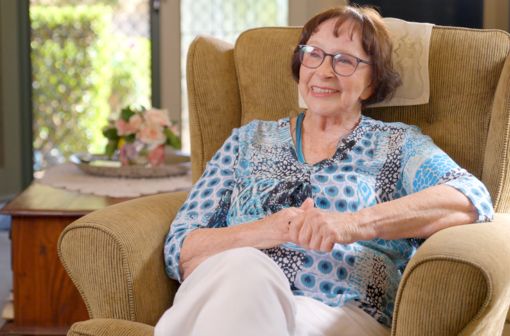Tags: Community & relationships Health Relationships
“It's really important when helping your elders maintain a positive attitude about their health that things are very clear to them.”—Jean Kittson, author of We Need to Talk About Mum & Dad
Key points
- Talk to your family to decide who is best placed to “ride shotgun” with your parents in managing their health.
- Build up a well-rounded care team of podiatrists, occupational therapists, dentists, dieticians, and other allied health professionals to help you support your parents' healthcare across all disciplines.
- Frame changes positively and give your parents all the information they need to make decisions about their health—but respect their decision at the end of the day.
When it comes to their health, how are your parents faring? If they’re in their late 60s, 70s or 80s, you might have noticed a few changes in how they’re managing physically and mentally day to day, or perhaps an increase in the number of healthcare appointments they need to attend.
Helping your parents keep on top of it all can be a daunting and challenging journey—for all of you. There’s navigating the healthcare system, the cost of care, and the possibility that your parents may refuse help in the first place. Most of all, there’s the juggle of it all.
Performer, author and host of 'Parenting Up with Australian Unity’, Jean Kittson's mother and father are 99 and 96, respectively. And although they've each experienced their share of health concerns, they're still living independently, thanks in part to the dedication of their personalised care team.
But it hasn’t always been easy. In this article, Jean, the author of We Need to Talk About Mum & Dad, and Dr Jeannie Yoo, Chief Medical Officer at Australian Unity, swap tips on how to help our older loved ones stay as well as possible for as long as possible.

Decide who will be your parents' lead support
As your parents age, health concerns are going to become a bigger part of their lives, but there are things you can do to help them stay on top of their wellbeing so they can live their best lives right to the end.
The first step, Jeannie says, is to have a conversation with your family, including your siblings, to decide who will take the lead in supporting your parents’ on-going health journey. That means going with them to GP and specialist appointments, and generally “riding shotgun”, as Jean puts it.
“Riding shotgun” means that healthcare professionals are talking to your parents, not you, she explains, and that you’re not speaking for them, unless they ask you to. But it also means you are across everything—taking notes, documenting the medication they’re on, and making sure they understand what the healthcare professional has said.
“I remember coming home from a visit and mum was very quiet and I said, ‘What's wrong, Mum?’ and she said, ‘Well, I have cancer, don't I?’” recalls Jean. “And I said, ‘Well, no, Mum—you've got a small BCC [basal cell carcinoma] on your foot and we’re going to get rid of it. She just heard the word ‘cancer’ and thought that was it."
Jeannie also points to the important role that adult children can play at medical appointments, and encourages you to ask questions or request clarification as needed. “Whoever you’re seeing will welcome the fact that they’ve got such an interested and supportive family member there helping their patient,” she says.
Sign up for wellbeing news
Get real wellbeing news, information and tips straight to your inbox.
Expand their care team—with their GP at its heart
As your parents' risk of various medical conditions increases as they age, their healthcare team will also expand, explains Jeannie. Be sure to take a well-rounded, multidisciplinary approach by scheduling (or encouraging your parents to schedule) appointments with podiatrists, physiotherapists, occupational therapists, dietitians and other allied health professionals.
Don’t forget that some of these appointments can be done via telehealth, for ease and convenience.
“One of the most important aspects about changing your loved one's mind about something is the relationship you have, how you have those conversations and how you present it, and whether all the information is presented.”
—Dr Jeannie Yoo, Chief Medical Officer,
Australian Unity
“It takes a village to make sure our older loved ones reach safe harbour at the end of their lives, and to keep them living the best life possible,” says Jeannie. “You really need to get a team together, and it needs an advocate, a family member usually, to draw it all together.”
“We talk about a team supporting our parents, but a team also supports the family," adds Jean. “We couldn't possibly do it on our own, so to put this team in place, we all feel supported.”
As at any other stage of life, your parents’ GP is a central part of their care team, so make sure they’re having regular consultations.
"Nurses and allied health practitioners have an important role, and the specialists are important, but they’re only there for part of the time and for some of the patient’s problems," explains Jeannie. “It’s actually the GP that holds the whole picture. Once you find a good GP, investing in that relationship is very worthwhile.”
.jpg?h=650&w=1200&hash=2C5E515EB03CF913B458F4C57E214DA7)
Frame lifestyle changes positively
We can all become a bit set in our ways as we age, and you may find your parents are resistant to certain lifestyle changes that might improve their overall health and wellbeing, such as wearing hearing aids.
But hearing impairment—which is common in older people—can affect their balance, as well as their ability to connect and communicate with others, says Jeannie. Balance issues obviously have long-term implications for physical health, and lack of connection can affect mental and emotional health—all of which can ultimately increase the risk of cognitive decline.
There are similar wide-ranging knock-on effects for any condition or diagnosis, so it's important to encourage your parents to look after their Real Wellbeing by using whatever tools and aids are available. This includes hearing aids, but also things like walking frames.
Other small lifestyle changes can have a big impact on their health and independence—such as changing the side of the bed they sleep on, so it's easier to get to the bathroom in the night, or removing trip hazards such as rugs or floor mats, especially if they are visually impaired.
Try to frame these changes positively as much as you can: it’s all about staying as healthy and independent as possible for as long as possible.
The importance of empathy and the dignity of risk
That said, things that may look like simple and obvious changes to you can sometimes be a big adjustment for your parents. “There can be downsides as well as upsides to any change, so aiming for empathy is really key,” says Jeannie.
Occasionally that means you may have to accept a decision you don't like or agree with—and this is where "the dignity of risk” comes in.
“It takes a village to make sure our elderly loved ones reach safe harbour at the end of their lives, and to keep them living the best life possible."
—Dr Jeannie Yoo, Chief Medical Officer,
Australian Unity
“You might say to your elder, ‘This doesn't look safe’, ‘This isn't good for your health’, or ‘You've got to stop eating those doughnuts’, or whatever it is,” explains Jean. “But it's their human right to make a decision about whether they want to do that or not.”
Jeannie notes: “One of the most important aspects about changing your loved one's mind about something is the relationship you have, how you have those conversations and how you present it, and whether all the information is presented.” But, at the end of the day, it’s still their decision.
Supporting the health of ageing parents really boils down to being proactive and systematic, encouraging, empathetic and informative. With regular check-ups and the right support team in place, you can feel confident that you're helping your parents stay healthier—and more independent—for longer.
The secret to staying well
When it comes to helping your parents stay well in their 60s and beyond, the "secret" is more or less the same as it is at any age: exercising regularly (including strength-training sessions for their changing muscles), eating a balanced diet, avoiding smoking, and minimise their alcohol intake. In addition, make sure your parents keep on top of their preventative care by screening for common ailments and conditions and getting regular check-ups, even if they feel well.
Disclaimer:
Information provided in this article is not medical advice and you should consult with your healthcare practitioner. Australian Unity accepts no responsibility for the accuracy of any of the opinions, advice, representations or information contained in this publication. Readers should rely on their own advice and enquiries in making decisions affecting their own health, wellbeing or interest.


